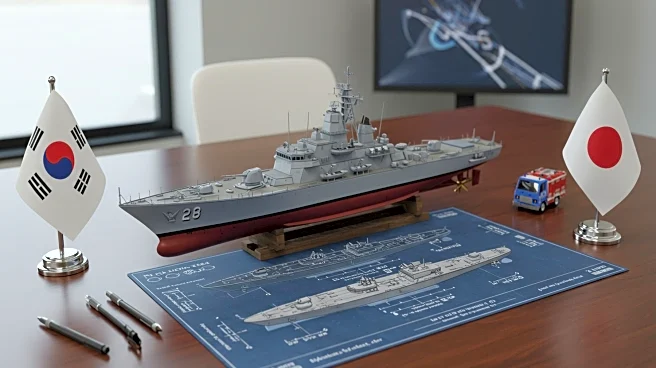What's Happening?
American lawmakers, including Senators Tammy Duckworth and Andy Kim, are visiting South Korea and Japan to explore potential collaborations in shipbuilding. The trip aims to leverage the expertise of these countries, which are the second and third largest shipbuilders globally, to enhance U.S. naval capabilities. The initiative is driven by concerns over China's dominance in shipbuilding, as it currently leads the world in naval ship production. The senators plan to discuss joint ventures for constructing and repairing noncombatant vessels for the U.S. Navy in the Indo-Pacific region. This move aligns with President Trump's directive to revitalize U.S. shipyards and engage foreign partners. The Pentagon has requested $47 billion for shipbuilding in its annual budget, highlighting the urgency of addressing the maritime power imbalance with China.
Why It's Important?
The U.S. is significantly lagging behind China in naval shipbuilding, which poses strategic risks in terms of maritime power balance. By collaborating with South Korea and Japan, the U.S. aims to bolster its shipbuilding capacity and modernize its aging fleet. This initiative could lead to increased investments in American shipyards and create opportunities for joint ventures, potentially enhancing the U.S. Navy's operational capabilities. The discussions focus on auxiliary vessels, which are crucial for supporting naval operations. Strengthening these capabilities is vital for maintaining U.S. influence in the Indo-Pacific region, where China's naval expansion is a growing concern.
What's Next?
The senators are expected to meet with representatives from major shipbuilders in South Korea and Japan to discuss potential collaborations. South Korea has already proposed a $150 billion investment in the U.S. shipbuilding industry, supporting the 'Make American Shipbuilding Great Again' initiative. Additionally, there are ongoing discussions with Hyundai Heavy Industries about investing in U.S. shipyards. These developments could lead to significant advancements in U.S. shipbuilding capabilities, potentially reducing the time and cost associated with repairing and constructing naval vessels.
Beyond the Headlines
The collaboration with South Korea and Japan could have broader implications for international relations and trade. Strengthening ties with these countries through shipbuilding partnerships may influence geopolitical dynamics in the Indo-Pacific region. Additionally, the initiative could stimulate economic growth in U.S. shipbuilding sectors, creating jobs and fostering technological advancements. However, it also raises questions about dependency on foreign expertise and the long-term sustainability of such partnerships.








